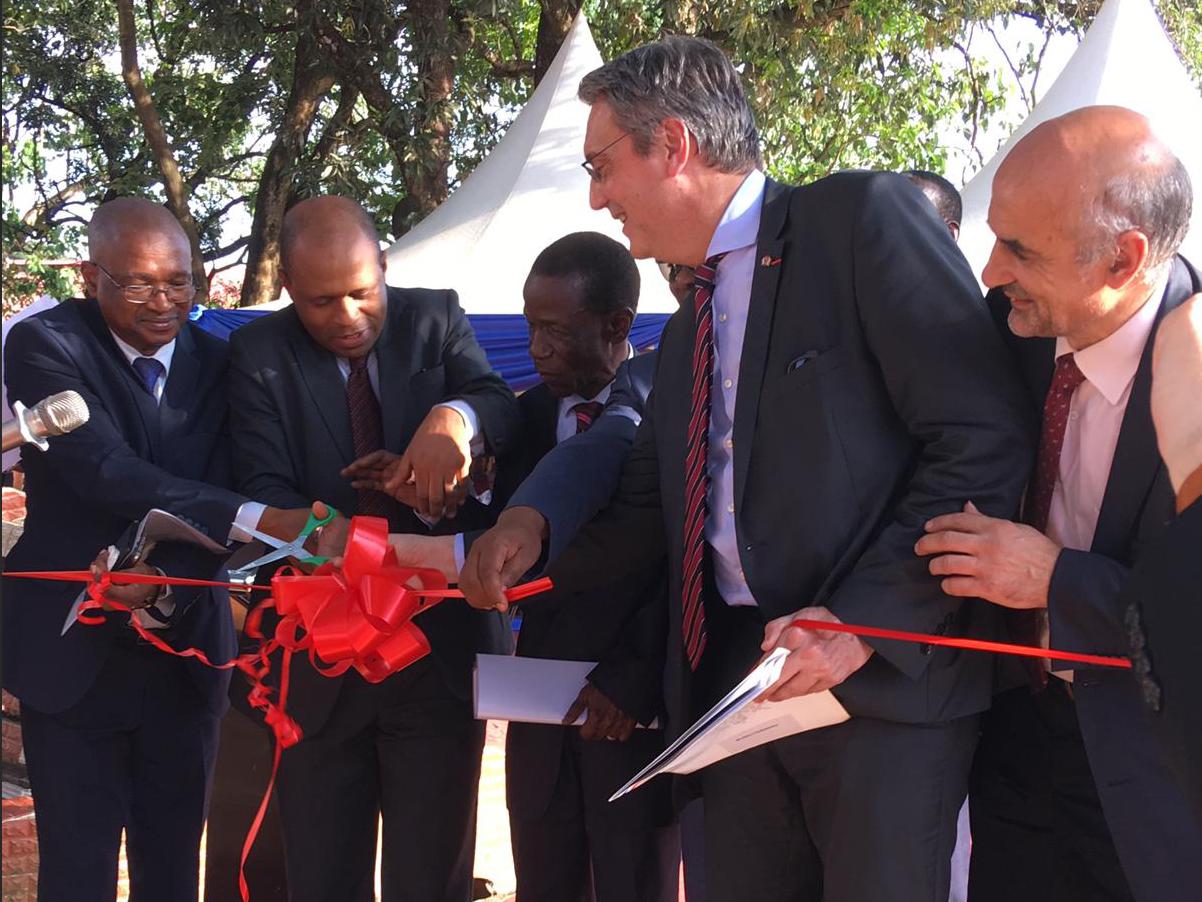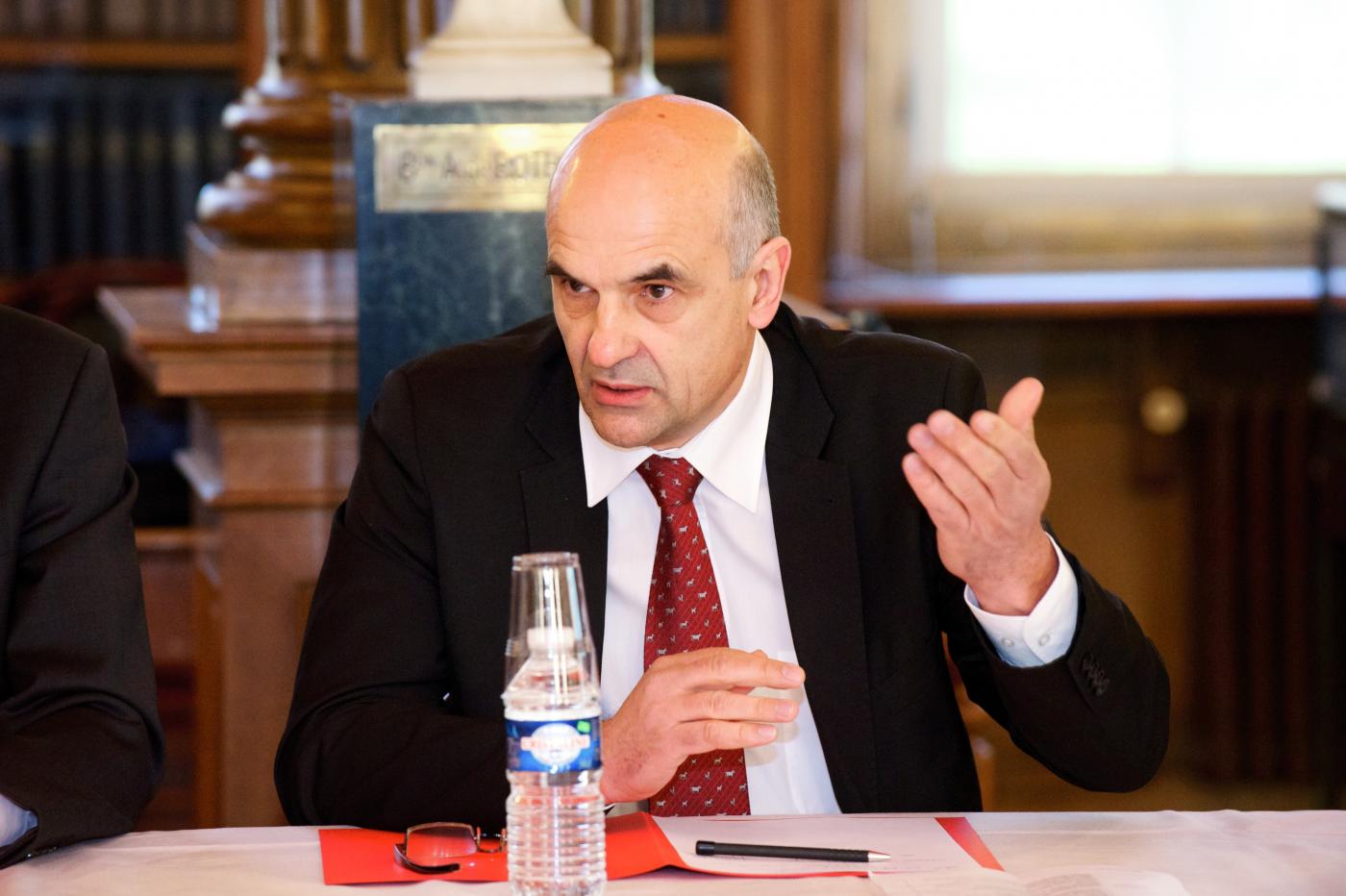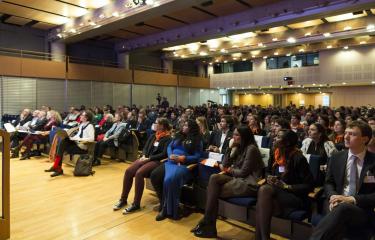The first laboratory at the Institut Pasteur de Guinée was officially opened on October 22, 2018. Based at Gamal Abdel Nasser University of Conakry, the Pasteur Laboratory will mainly focus on training, diagnostics and research.
With the support of the French Ministry of Europe and Foreign Affairs and the Expertise France agency, in connection with the LAB-NET program1 a 230m2 space generously provided by Gamal Abdel Nasser University of Conakry has been turned into a modern training center, the Pasteur Laboratory. Its activities will mainly be focused on teaching, diagnostics and research.

International quality and safety standards
The laboratory is fitted with the very latest technology in terms of both infrastructure and equipment. An air handling unit constantly filters the air circulating in the laboratory, while also creating a succession of negative pressures to secure containment of the viruses, bacteria and parasites under study. An absolute filter prevents them from escaping into the environment, and the waste produced is destroyed in a high-tech incinerator that does not emit smoke or fumes. A secure cold room will house a biobank for long-term storage of valuable samples. A sophisticated technical platform (with gene amplifiers, equipment for examining antibodies, microscopes, centrifuges, etc.) will provide scientists and students with an outstanding work space that offers high safety and quality standards.
"It was vital for us to have a facility that meets international safety standards and is equipped with the latest technology so that we can provide theoretical and practical training for Guinea's future scientists," explains Noël Tordo, Director of the Institut Pasteur de Guinée. The facility will be used to train up experts in serological and molecular diagnostics and to give them a solid grounding in best laboratory and biosafety practices – areas where Guinea was found to be lacking during the Ebola outbreak.
Strengthening local expertise to tackle emerging pathogens
Immediately after the inauguration of the Pasteur Laboratory, 20 students arrived for a practical training course, running from October 22 to November 3, on serological and molecular detection techniques for foot-and-mouth disease, an animal virus that has led to an outbreak currently affecting livestock in Guinea. This course will be followed by several others over the coming months. The Pasteur Laboratory reflects the long-term intention of the Institut Pasteur de Guinée to maintain close links with Gamal Abdel Nasser University of Conakry. The new facility includes a teaching room that can host 15 students. The practical work will take place in real research conditions – in the Pasteur Laboratory, the students will use the same technological platform as that used by Institut Pasteur de Guinée members for their research and diagnostic activities.
The inauguration of the Pasteur Laboratory demonstrates the importance placed by French and Guinean authorities on building up local response capabilities to emerging diseases, especially hemorrhagic fevers and other zoonoses, as a matter of priority. The Pasteur Laboratory marks the first stage in the development of the Institut Pasteur de Guinée. The main building is currently under construction on a neighboring site, thanks to the support of the French Development Agency. The Institut Pasteur de Guinée is an independent Guinean public institution under the aegis of the Ministry of Higher Education and Scientific Research, working in close cooperation with the Ministries of Health, Farming and the Environment, reflecting the "One Health" concept.

Noël Tordo, director of the Institut Pasteur de Guinée
These training courses are a way for us to identify promising young students who are interested, keen and enthusiastic.

The 2014 Ebola outbreak, which had a severe impact on West Africa and especially Guinea, revealed an urgent need to strengthen local expertise and skills in the areas of diagnostics and health research. Since 2016, the team at the Institut Pasteur de Guinée has been firmly committed to this task, in collaboration with Guinean institutions (CERE, ISSMV and UGANC) and with the support of French partners (ANSES, IRD, CIRAD and Inserm) and international partners, including the West African members of the Institut Pasteur International Network and the Friedrich Loeffler Institute in Germany. Two initial courses providing a theoretical introduction to molecular biology as applied to the genetic and serological detection of pathogens were attended by 50 Guinean students in November 2016 and February 2017. Some of the participants were then invited to a more advanced theoretical and practical training course based around the "One Health" concept in March 2017. Two other courses on laboratory management were held in February and June 2018, in close cooperation with the Mérieux Foundation, for local laboratory managers.
"These training courses are a way for us to identify promising young scientists who are interested, keen and enthusiastic. A dozen of these researchers have already been sent for periods ranging from three months to two years to international laboratories, especially at the Pasteur Center in Cameroon, the Institut Pasteur de Dakar and the Institut Pasteur de Madagascar, to complete training courses, some leading to qualifications. A number of these promising scientists will form the first committed teams of the Institut Pasteur de Guinée. The Pasteur Laboratory will now give us the opportunity to support them in their research and diagnostic work and to tailor future courses to their training needs and to the identification of new talent," continues the Director of the Institut Pasteur de Guinée.
The Institut Pasteur de Guinée was set up in response to the needs expressed by the Guinean authorities following the Ebola crisis in 2014. It is the latest member to join the Institut Pasteur International Network.
1A project to strengthen the network of routine and reference laboratories in Guinea has been under way since April 2015, funded by the French Ministry of Europe and Foreign Affairs and led by a consortium composed of the Mérieux Foundation, the Institut Pasteur in Paris and the Expertise France agency.





